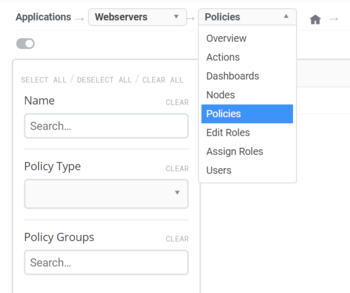Difference between revisions of "Policy"
m |
m |
||
| Line 5: | Line 5: | ||
Policies are created and edited in an [[application|application]]. A policy is instructions for the monitoring of something from a computer. Policies are deployed to a node using [[group|groups]]. | Policies are created and edited in an [[application|application]]. A policy is instructions for the monitoring of something from a computer. Policies are deployed to a node using [[group|groups]]. | ||
| + | |||
| + | After entering an [[application|application]] use the [[Breadcrumbs|breadcrumb navigator]] to select the policies option to see the [[Policies_view|policies view]] | ||
| + | |||
| + | [[file:breadcrums_config_policy.png|350px]] | ||
== Policy types == | == Policy types == | ||
There are currently 14 different policy types. Each policy is targeted to monitor a different aspect of a server. | There are currently 14 different policy types. Each policy is targeted to monitor a different aspect of a server. | ||
| − | # [[Command execution policy|Command execution]] | + | # '''[[Command execution policy|Command execution]]''' Runs a executable or script on a server and returns the result |
| − | # [[Disk Filesystem policy|Disk / Filesystem]] | + | # '''[[Disk Filesystem policy|Disk / Filesystem]]''' Montor the used space and free space for a file system |
| − | # [[Event policy|Event]] | + | # '''[[Event policy|Event]]''' Intercept an event sent from the event program and inspect it for enhancements |
| − | # [[HTTP response policy|HTTP response]] | + | # '''[[HTTP response policy|HTTP response]]''' Monitor a webpage for key performance metrics |
| − | # [[Log file policy|Log file]] | + | # '''[[Log file policy|Log file]]''' Watches a log file for text matches or file size |
| − | # [[Ping response policy|Ping response]] | + | # '''[[Ping response policy|Ping response]]''' Ping a host and inspect the return results |
| − | # [[Port availability policy|Port availability]] | + | # '''[[Port availability policy|Port availability]]''' Watch the local or a remote host for the availability of a port |
| − | # [[Process performance policy|Process performance]] | + | # '''[[Process performance policy|Process performance]]''' Watch a local process for key metrics |
| − | # [[Service status policy|Service status]] | + | # '''[[Service status policy|Service status]]''' Watch a local service for service state changes |
| − | # [[SNMP Poll policy|SNMP policy]] | + | # '''[[SNMP Poll policy|SNMP policy]]''' Poll a SNMP device |
| − | # [[SNMP Trap receipt policy|SNMP Trap recipient]] | + | # '''[[SNMP Trap receipt policy|SNMP Trap recipient]]''' Inspect a received SNMP trap |
| − | # [[Veloopti Agent Health policy|Veloopti agent health]] | + | # '''[[Veloopti Agent Health policy|Veloopti agent health]]''' Watch a Veloopti agent to see whether it is connected or not |
| − | # [[Windows Performance Library policy|Windows performance library]] | + | # '''[[Windows Performance Library policy|Windows performance library]]''' Inspect the Windows Performance Library |
| − | # [[CI Metric Thresholds policy|CI Metric thresholds]] | + | # '''[[CI Metric Thresholds policy|CI Metric thresholds]]''' Inspect the global metrics that are being collected for the node |
== Deploying a policy to a server == | == Deploying a policy to a server == | ||
Revision as of 21:46, 28 January 2019
Home > An Overview > Concepts > Policy
1 Overview
Policies are created and edited in an application. A policy is instructions for the monitoring of something from a computer. Policies are deployed to a node using groups.
After entering an application use the breadcrumb navigator to select the policies option to see the policies view
2 Policy types
There are currently 14 different policy types. Each policy is targeted to monitor a different aspect of a server.
- Command execution Runs a executable or script on a server and returns the result
- Disk / Filesystem Montor the used space and free space for a file system
- Event Intercept an event sent from the event program and inspect it for enhancements
- HTTP response Monitor a webpage for key performance metrics
- Log file Watches a log file for text matches or file size
- Ping response Ping a host and inspect the return results
- Port availability Watch the local or a remote host for the availability of a port
- Process performance Watch a local process for key metrics
- Service status Watch a local service for service state changes
- SNMP policy Poll a SNMP device
- SNMP Trap recipient Inspect a received SNMP trap
- Veloopti agent health Watch a Veloopti agent to see whether it is connected or not
- Windows performance library Inspect the Windows Performance Library
- CI Metric thresholds Inspect the global metrics that are being collected for the node
3 Deploying a policy to a server
Policies are deployed to a server by adding it to a policy group. The policy group must also be linked to a node group that contains the server that the policy is to be deployed to.
One or more policies can be added to a policy group. A policy in a policy group is a member of the group. In order for the policies in the policy group to be deployed to the nodes in a node group the policy group must be linked to the node group. A policy group can be linked to one or more node groups. All nodes in the node group that have a policy group linked to it can have the policies deployed to them.
A policy group is located in an application and is not able to be linked to a node group outside of the application. A policy cannot be directly deployed to a node.
